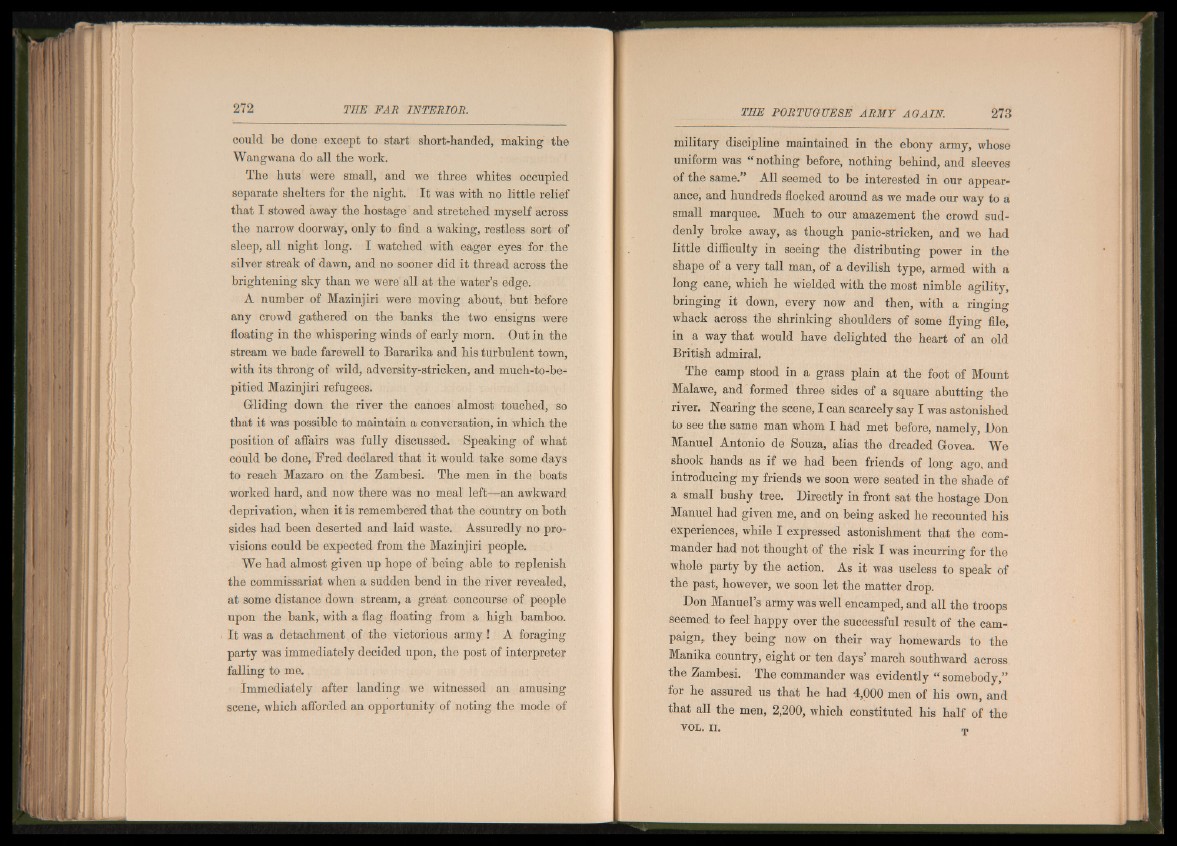
could be done except to start short-handed, making the
Wangwana do all the work.
The huts were small, and we three whites occupied
separate shelters for the night. I t was with no little relief
that I stowed away the hostage and stretched myself across
the narrow doorway, only to find a waking, restless sort of
sleep, all night long. I watched with eager eyes for the
silver streak of dawn, and no sooner did it thread across the
brightening sky than we were all at the water’s edge.
A number of Mazinjiri were moving about, but before
any crowd gathered on the banks the two ensigns were
floating in the whispering winds of early morn. Out in the
stream we bade farewell to Bararika and his turbulent town,
with its throng of wild, adversity-stricken, and much-to-be-
pitied Mazinjiri refugees.
Gliding down the river the canoes almost touched, so
that it was possible to maintain a conversation, in which the
position of affairs was fully discussed. Speaking of what
could be done, Fred declared that it would take some days
to reach Mazaro on the Zambesi. The men in the boats
worked hard, and now there was no meal left—an awkward
deprivation, when it is remembered that the country on both
sides had been deserted and laid waste. Assuredly no provisions
could be expected from the Mazinjiri people.
We had almost given up hope of being able to replenish
the commissariat when a sudden bend in the river revealed,
at some distance down stream, a great concourse of people
upon the bank, with a flag floating from a high bamboo.
I t was a detachment of the victorious army! A foraging
party was immediately decided upon, the post of interpreter
falling to me.
Immediately after landing we witnessed an amusing
scene, which afforded an opportunity of noting the mode of
military discipline maintained in the ebony army, whose
uniform was “ nothing before, nothing behind, and sleeves
of the same.” All seemed to be interested in our appearance,
and hundreds flocked around as we made our way to a
small marquee. Much to our amazement the crowd suddenly
broke away, as though panic-stricken, and we had
little difficulty in seeing the distributing power in the
shape of a very tall man, of a devilish type, armed with a
long cane, which he wielded with the most nimble agility,
bringing it down, every now and then, with a ringing
whack across the shrinking shoulders of some flying file,
in a way that would have delighted the heart of an old
British admiral.
The camp stood in a grass plain at the foot of Mount
Malawe, and formed three sides of a square abutting the
river. Nearing the scene, I can scarcely say I was astonished
to see the same man whom I had met before, namely, Don
Manuel Antonio de Souza, alias the dreaded Govea. We
shook hands as if we had been friends of long ago, and
introducing my friends we soon were seated in the shade of
a small bushy tree. Directly in front sat the hostage Don
Manuel had given me, and on being asked he recounted his
experiences, while I expressed astonishment that the commander
had not thought of the risk I was incurring for the
whole party by the action. As it was useless to speak of
the past, however, we soon let the matter drop.
Don Manuel’s army was well encamped, and all the troops
seemed to feel happy over the successful result of the campaign,
they being now on their way homewards to the
Manika country, eight or ten days’ march southward across
the Zambesi. The commander was evidently “ somebody,”
for he assured us that he had 4,000 men of his own, and
that all the men, 2 ,2 0 0 , which constituted his half of the